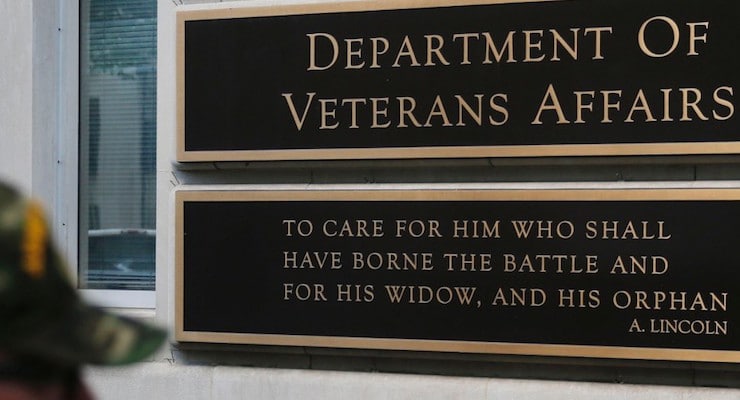

A man walks past the Department of Veterans Affairs headquarters building in Washington, D.C., on May 23, 2014. (Photo: Larry Downing/Reuters)
Editor’s Note: This ‘open-letter’ editorial by The People’s Pundit is a precursor to a study conducted by PPD in Florida, the state with the second largest population of veterans in the country. It’s one story, which I felt the need to share because the veterans in the study were too concerned about retaliation in the form of unfair Compensation and Pension claim decisions, among other concerns.
Open Letter to President-Elect Donald J. Trump,
The Department of Veterans Affairs (VA) desperately needs to be reformed. With a businessman heading to Washington D.C. who will enjoy party majorities in the U.S. House and Senate, I’m cautiously optimistic something can finally be done. We’ve all heard about veterans dying while they wait to receive care, a national disgrace that should be a top priority.
But another top complaint by veterans interviewed in central Florida surrounded claims examiners, who deny veterans deserved benefits because they do not have the resources to fight in the appeal process. Most believe, with some evidence, the bureaucrats are getting rewarded for finding ways to deny legitimate rewardable claims.
Those with experience and knowledge of the process agree that “something” has to be done. But we don’t all agree what that something is let alone what action we can and should take to fix it. The best way I can contribute to this–I believe–is to simply tell my own story and highlight where changes would’ve needed to be made to have prevented it.
When conducting the field study on veterans at the Orlando Veterans Affairs Medical Center and Malcom Randall Veterans Affairs Medical Center, the latter being located in Gainesville, Fla., it quickly became clear my situation was not unique. In fact, we believe the study uncovered a pattern. In 39% of the cases in which a veteran filed an appeal, we found the VA ignored law regarding something called “relative equipoise.”
In these cases, the veterans submitted evidence in support of their claim that included opinions from their own private doctors and/or doctors within the VA, which established a “Nexus” between their service and their claimed condition. In response, the VA simply ordered examinations by agency or contracted physicians that disputed that evidence and the claim examiner took that position.
That’s against the law.
When after consideration of all evidence and material of record in a case before the Departments with respect to benefits under laws administred by the Secretary, there is an approximate balance of positive and negative evidence regarding merits of an issue material to the determination of the matter, the benefit of the doubt in resolving each issue shall be given to the claimant. — 38 U.S.C.A § 5107(b) (West 1995).
Put simply, in the event of competing medical opinions by equally credentialed physicians, the veterans physician outweighs the VA doctor. In my own case, the VA physician did NOT have equal credentials and, in fact, wasn’t even board certified. Further, there was no explaination provided by the claims officer. That was also the case among roughly 60% of the other veterans interviewed, which is also a national disgrace.
And that’s also against the law.
When there is ‘significant evidence’ in support of the veteran’s claim, if the Board denies the claim, it must provide an adequate explaination as to why the evidence is not in ‘relative equipoise’ so as to warrant application of the benefit-of-the-doubt rule in 38 U.S.C.A § 5107(b).
In nearly a quarter (23%) of the cases in which the veteran appealed a claim for a secondary condition based on at least relative equipoise, including in my own case, the VA decided to attack the primary service-connected disability rather than answer for having reached a previous illegal decision. They figure if they can reduce or eliminate a veteran’s primary service-connected condition, then they can deny or reduce any future benefit to the veteran.
Here’s the kicker: In the case of myself and roughly a fifth of the appeal cases, the veteran’s primary condition is a degenerative condition, meaning it only gets worse as time goes on. We’re talking about conditions like chronic bursitus and traumatic brain injury (TBI), not trenchfoot or poison ivy. Only in the VA’s distorted and corrupt world do medical conditions like this improve over time.
On the contrary, the rest of the medical community agrees they get worse.
Yet, the decision review officers simply ignor the appeal rationale and veteran-provided medical opinions in the hope they either don’t know any better, don’t have the resources to see another private doctor to further overrule the hack they got to write up a competing opinion, or flat-out disappear without challenge.
Who knows? After what we’ve learned it wouldn’t at all surprise me that they are hoping veterans die before their claims are decided by a board.
Either way, they are just hoping the veteran goes away quietly so they can get a reward for saving the Department of Veterans Affairs money. In far too many cases, most of which involving veterans who are in far worse shape than me, they do just disappear. Or, they file a futile appeal incorrectly. In the event they do not, such as the case with myself, they will look for other ways to screw the veteran out of a legitimate claim and the medical care that comes with it.
President-elect Trump, by the time you take office it likely will be too late for me. But it won’t be too late to do something about this for veterans in the future. Who the hell will want to serve a country that places the bonuses and career advancements of bureaucrats above their sacrifice?
Truly,
The People’s Pundit







